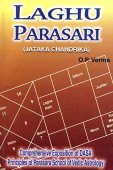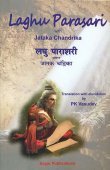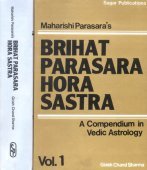Maraka, Māraka: 17 definitions
Introduction:
Maraka means something in Hinduism, Sanskrit, Buddhism, Pali, Marathi, Hindi. If you want to know the exact meaning, history, etymology or English translation of this term then check out the descriptions on this page. Add your comment or reference to a book if you want to contribute to this summary article.
Alternative spellings of this word include Marak.
In Hinduism
Jyotisha (astronomy and astrology)
Source: Wisdom Library: Brihat Samhita by VarahamihiraMaraka (मरक) refers to “death”, according to the Bṛhatsaṃhitā (chapter 5), an encyclopedic Sanskrit work written by Varāhamihira mainly focusing on the science of ancient Indian astronomy astronomy (Jyotiṣa).—Accordingly, “If there should be both lunar and solar eclipses in one month, princes will suffer both from dissensions among their own army and from wars. If the eclipse should occur at rising or setting, the crops of Śarat (October and November) will perish and princes will suffer. In total eclipses if the eclipsed sun or moon should be subject to malefic planetary influence, there will be death and famine in the land [i.e., maraka—durbhikṣamarakadau]”.

Jyotisha (ज्योतिष, jyotiṣa or jyotish) refers to ‘astronomy’ or “Vedic astrology” and represents the fifth of the six Vedangas (additional sciences to be studied along with the Vedas). Jyotisha concerns itself with the study and prediction of the movements of celestial bodies, in order to calculate the auspicious time for rituals and ceremonies.
Languages of India and abroad
Pali-English dictionary
Source: BuddhaSasana: Concise Pali-English Dictionarymāraka : (adj.) bringing death; one who kills.
Source: Sutta: The Pali Text Society's Pali-English DictionaryMāraka, (-°) (fr. māreti) one who kills or destroys, as manussa° man-killer J. II, 182; hatthi° elephant-killer DhA. I, 80.—m. in phrase samāraka (where the —ka belongs to the whole cpd.) see under samāraka. (Page 530)

Pali is the language of the Tipiṭaka, which is the sacred canon of Theravāda Buddhism and contains much of the Buddha’s speech. Closeley related to Sanskrit, both languages are used interchangeably between religions.
Marathi-English dictionary
Source: DDSA: The Molesworth Marathi and English Dictionarymāraka (मारक).—a S That kills or destroys; and fig. that counterworks, corrects, neutralizes, deprives of active qualities--a medicine &c.
--- OR ---
māraka (मारक).—m S Epidemic disease; plague or pestilence.
--- OR ---
mārakā (मारका).—a mārakaṇā a C (māraṇēṃ) Given to butting or kicking.
--- OR ---
mārakā (मारका).—m (māra) Press and burden; killing, crushing, or overbearing press (of a business or work in general). v lāva, paḍa, basa, asa.
--- OR ---
mārakā (मारका).—m A description of piśāca. See the four classes under cauka.
Source: DDSA: The Aryabhusan school dictionary, Marathi-Englishmāraka (मारक).—a That kills.
--- OR ---
mārakā (मारका).—a Given to kicking or butting.
Marathi is an Indo-European language having over 70 million native speakers people in (predominantly) Maharashtra India. Marathi, like many other Indo-Aryan languages, evolved from early forms of Prakrit, which itself is a subset of Sanskrit, one of the most ancient languages of the world.
Sanskrit dictionary
Source: DDSA: The practical Sanskrit-English dictionaryMaraka (मरक).—[mṛ-vun] A plague, murrain, pestilential disease, an epidemic.
Derivable forms: marakaḥ (मरकः).
--- OR ---
Māraka (मारक).—a. [mṛ ṇic ṇvul] (At the end of comp.) Killing, destroying, slaying.
-kaḥ 1 Any pestilential disease, plague, epidemic.
2) The god of love.
3) A murderer, destroyer in general.
4) A hawk.
-kam 1 Death of all creatures at the dissolution of the universe.
2) Vermilion (Mar. higūḷa).
Source: Cologne Digital Sanskrit Dictionaries: Edgerton Buddhist Hybrid Sanskrit DictionaryMāraka (मारक).—(-māraka), ifc. [bahuvrīhi], = Māra: in sa-māraka, in- cluding Māra, common in phrases like sadevakasya lokasya samārakasya…Saddharmapuṇḍarīka 21.7; loc. of same, Suvarṇabhāsottamasūtra 9.17; etc.
Source: Cologne Digital Sanskrit Dictionaries: Shabda-Sagara Sanskrit-English DictionaryMaraka (मरक).—m.
(-kaḥ) Epidemic or pestilential disease. E. mṛ to die, vun aff.
--- OR ---
Māraka (मारक).—m.
(-kaḥ) 1. Epidemic disease, plague. 2. A falcon, a hawk. 3. A slayer, a destroyer. 4. The god of death. E. mṛ to die, causal form, aff. vun, ṇvul or ghañ .
Source: Cologne Digital Sanskrit Dictionaries: Benfey Sanskrit-English DictionaryMaraka (मरक).—i. e. mṛ + aka, m. Epidemic disease.
--- OR ---
Māraka (मारक).—i. e. mṛ, [Causal.], + aka, m. 1. A slayer. 2. A hawk. 3. Plague.
Source: Cologne Digital Sanskrit Dictionaries: Cappeller Sanskrit-English DictionaryMaraka (मरक).—[masculine] epidemic, plague.
--- OR ---
Māraka (मारक).—[feminine] rikā killing, murdering (—°); [masculine] pestilence (also [rarely] rikā), the god of death.
Source: Cologne Digital Sanskrit Dictionaries: Monier-Williams Sanskrit-English Dictionary1) Maraka (मरक):—[from mara] m. an epidemic, plague, mortality, [Varāha-mihira; Suśruta]
2) [v.s. ...] [plural] Name of a people, [Mārkaṇḍeya-purāṇa]
3) Māraka (मारक):—[from māra] mfn. (ifc. f(ā). ), killing a killer, murderer (cf. triand daśa-mārikā)
4) [v.s. ...] calcining (cf. lohamāraka)
5) [v.s. ...] m. any deadly disease, plague, pestilence (personified as the god of death), [Śaṃkarācārya]
6) [v.s. ...] a falcon, hawk, [cf. Lexicographers, esp. such as amarasiṃha, halāyudha, hemacandra, etc.]
7) [v.s. ...] m. (also n.) death of all creatures at the dissolution of the universe, [cf. Lexicographers, esp. such as amarasiṃha, halāyudha, hemacandra, etc.]
Source: Cologne Digital Sanskrit Dictionaries: Yates Sanskrit-English Dictionary1) Maraka (मरक):—(kaḥ) 1. m. Epidemic disease.
2) Māraka (मारक):—(kaḥ) 1. m. Epidemic disease; a falcon; a slayer, destroyer.
Source: DDSA: Paia-sadda-mahannavo; a comprehensive Prakrit Hindi dictionary (S)Māraka (मारक) in the Sanskrit language is related to the Prakrit word: Māraga.
[Sanskrit to German]
Sanskrit, also spelled संस्कृतम् (saṃskṛtam), is an ancient language of India commonly seen as the grandmother of the Indo-European language family (even English!). Closely allied with Prakrit and Pali, Sanskrit is more exhaustive in both grammar and terms and has the most extensive collection of literature in the world, greatly surpassing its sister-languages Greek and Latin.
Hindi dictionary
Source: DDSA: A practical Hindi-English dictionary1) Māraka (मारक) [Also spelled marak]:—(a) killing, deadly, causing death.
2) Mārakā (मारका) [Also spelled marka]:—(nm) mark, trademark; sign; ~[ke kā] remarkable (as [mārake kī bāta]).
...
Kannada-English dictionary
Source: Alar: Kannada-English corpusMāraka (ಮಾರಕ):—
1) [adjective] causing or capable of causing death; mortal; fatal.
2) [adjective] causing or capable of causing heavy damage or impairment.
--- OR ---
Māraka (ಮಾರಕ):—
1) [noun] that which causes or is capable of causing death; mortal; fatal.
2) [noun] that which causes or is capable of causing heavy damage or impairment.
3) [noun] he wo kills, destroys.
4) [noun] any of several epidemic diseases as plague, cholera, etc. that spreads rapidly and causes death in a large scale.
5) [noun] any of various accipitrine birds having short, rounded wings and a long tail and legs; a hawk.
6) [noun] (myth.) the distruction of all living beings at the time of universal deluge.
7) [noun] (astrol.) the lord of second and seventh house from the house of birth (who is supposed to cause jeopardy, peril to the person concerned).
Kannada is a Dravidian language (as opposed to the Indo-European language family) mainly spoken in the southwestern region of India.
See also (Relevant definitions)
Starts with (+26): Mara-kalavelvi, Marakaba, Marakabbu, Marakadya, Marakaha, Marakaja, Marakakalam, Marakakara, Marakala, Marakalaga, Marakalangipatchilai, Marakali, Marakalti, Marakalu, Marakam, Marakamcavala, Marakan, Marakapas, Marakaprada, Marakaranda.
Ends with (+33): Ahimaraka, Akaranamaraka, Amaraka, Anushthanasmaraka, Apasmaraka, Arasukumaraka, Ashvamaraka, Bhramaraka, Camaraka, Carmaraka, Damaramaraka, Dharmasmaraka, Gramakumaraka, Hatthimaraka, Hayamaraka, Hyamaraka, Ila-maraka, Jalakumaraka, Janamaraka, Jarakamaraka.
Full-text (+17): Vahnimaraka, Lohamaraka, Hayamaraka, Marakam, Ashvamaraka, Kalimaraka, Marakata, Vannimarakam, Marayin, Janamaraka, Marak, Madhumaraka, Ahimaraka, Mari, Marka, Mura, Maragi, Marika, Sitamaraka, Sitasara.
Relevant text
Search found 8 books and stories containing Maraka, Māraka, Mārakā; (plurals include: Marakas, Mārakas, Mārakās). You can also click to the full overview containing English textual excerpts. Below are direct links for the most relevant articles:
Significance of the Moon in Ancient Civilizations (by Radhakrishnan. P)
3. Horoscope Chart of Ramakrishnan < [Chapter 14 - Case Studies of Natal Chart]
9. Horoscope of Smt. Kamala (Vrana-yoga) < [Chapter 14 - Case Studies of Natal Chart]
2. Dr. Balamuralikrishna (Carnatic Voclist) < [Chapter 14 - Case Studies of Natal Chart]
Kautilya Arthashastra (by R. Shamasastry)
Chapter 4 - Molestations, Obstructions and Financial Troubles < [Book 8 - Concerning Vices and Calamities]
Chapter 3 - Remedies against National Calamities < [Book 4 - Removal of Thorns]
Chapter 4 - Neutrality after Proclaiming War or after Concluding a Treaty of Peace < [Book 7 - The End of the Six-fold Policy]
Sushruta Samhita, volume 3: Sharirasthana (by Kaviraj Kunja Lal Bhishagratna)
Charaka Samhita and Sushruta Samhita (by Nayana Sharma)
Epidemics (maraka) < [Chapter 6]
Rasa Jala Nidhi, vol 1: Initiation, Mercury and Laboratory (by Bhudeb Mookerjee)
Part 13 - Mercurial operations (11): Swooning of mercury (murchhana) < [Chapter IV-V - Mercurial operations]
Reviews < [December 1944]
Related products


